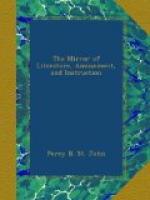LORD CLARE.
On the road to Bologna he had met with his early and dearest friend, Lord Clare, and the following description of their short interview is given in his “Detached Thoughts.”
“Pisa, November 5th, 1821.
“’There is a strange coincidence sometimes in the little things of this world, Sancho,’ says Sterne in a letter (if I mistake not,) and so I have often found it.
“Page 128, article 91, of this collection, I had alluded to my friend Lord Clare in terms such as my feelings suggested. About a week or two afterwards, I met him on the road between Imola and Bologna, after not having met for seven or eight years. He was abroad in 1814, and came home just as I set out in 1816.
“This meeting annihilated for a moment all the years between the present time and the days of Harrow. It was a new and inexplicable feeling, like rising from the grave, to me. Clare too was much agitated—more in appearance than myself; for I could feel his heart beat to his fingers’ ends, unless, indeed, it was the pulse of my own which made me think so. He told me that I should find a note from him left at Bologna. I did. We were obliged to part for our different journeys, he for Rome, I for Pisa, but with the promise to meet again in spring. We were but five minutes together, and on the public road; but I hardly recollect an hour of my existence which could be weighed against them. He had heard that I was coming on, and had left his letter for me at Bologna, because the people with whom he was travelling could not wait longer.
“Of all I have ever known, he has always been the least altered in every thing from the excellent qualities and kind affections which attached me to him so strongly at school. I should hardly have thought it possible for society (or the world, as it is called) to leave a being with so little of the leaven of bad passions.
“I do not speak from personal experience only, but from all I have ever heard of him from others, during absence and distance.”
On the subject of intimacies formed by Lord Byron, not only at the period of which we are speaking, but throughout his whole life, it would be difficult to advance any thing more judicious, or more demonstrative of a true knowledge of his character, than is to be found in the following remarks of one who had studied him with her whole heart, who had learned to regard him with the eyes of good sense, as well as of affection, and whose strong love, in short, was founded upon a basis the most creditable both to him and herself,—the being able to understand him.[1]
[1] “My poor Zimmerman,
who now will understand thee?”—such
was
the
touching speech addressed to Zimmerman by his wife,
on her
deathbed,
and there is implied in these few words all that a
man
of morbid sensibility must be dependent for upon the
tender
and self-forgetting tolerance of the woman with whom
he
is
united.




